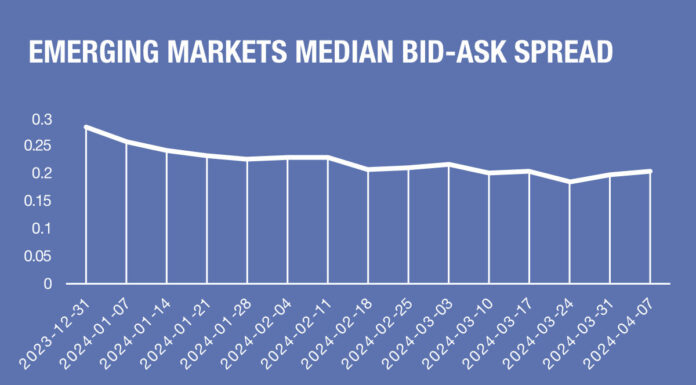By Massimiliano Raposio, Head of E-Commerce Distribution, Market Hub – IMI CIB Division, Intesa Sanpaolo.
The purpose of this short note is to summarise our views on the future development of agency fixed income execution for private banks and retail aggregators orders execution – Market Hub’s key area of focus – and how we see these trends interacting with the broader industry developments driven by buy-side requirements of more sophisticated electronic execution.
We refer to agency fixed income execution as the engagement by a client of an agency broker for outsourcing the entire execution workflow.
Execution Services providers such as Market Hub PIT, the fixed income agency desk of the Intesa Sanpaolo Corporate & Investment Banking Division, leveraged on their expertise, multi-venue connectivity, and technology to provide clients with unconflicted, anonymous, efficient and tailor-made fixed income order execution.
Execution and post-trade workflows are delivered through a single-point-of-access, end-to-end infrastructure (including potentially also integrated custody and settlement services), directly managed by Market Hub. Clients are effectively removed from the complexity of directly managing connectivity to all relevant electronic platforms and markets and of handling settlement with individual liquidity providers. This is available regardless of venue or protocol, covering both RFQs and CLOB liquidity.
In an outsourced execution relationship, the client pays a transparent variable brokerage fee in lieu of establishing and maintaining a proprietary trading infrastructure and the related fixed costs. Full order audit trail and best execution proof are provided by the broker to support and validate the execution process.
This solution is typically sought after by financial institutions executing for retail investors, but it is increasingly more appealing in the buy-side space, with specific reference to smaller institutions seeking a simplified access to new execution technologies.
In a recent article we provided an overview of trends in retail-sized fixed income trading (see The Agency Broker Hub, April 2023). We looked back at how a rising interest rates environment leading to an unprecedented increase in retail demand combined with the development of electronic platforms boosted by remote working long term trends, has dramatically changed bond execution patterns in the Italian market, Market Hub historic area of focus. A trend not limited to Italy, when looking at the total share of automatic routing of orders reported by the likes of Tradeweb and MarketAxess.
We argued that what we are currently experiencing may be the long-anticipated epiphany of the so-called “electronification” and “equitisation” of fixed income execution: smart order routing, electronic execution, true interaction between CLOB and RFQ venues for retail orders.
Looking ahead we anticipate further demand for agency brokers’ services, driven by financial institutions in need of managing retail orders, in a cost effective and regulatory compliant manner. This is due to the importance for brokerage desks at retail and private banks of certifying best execution and the request from their banking networks of an efficient and low-cost process when completing an order, de facto mirroring the same customer experience of executing in the equity markets, ideally from a single brokerage relationship covering all asset classes, as it is the case for Market Hub clients.
Furthermore, an agency broker execution process effectively removes conflicts of interest with the execution of an order, avoiding the risk of preferential links with specific liquidity providers, including bank’s own trading desk.
Agency fixed income execution services are already established in the market and an increasing number of financial institutions are relying on specialised intermediaries to source liquidity and on externalised order management as an alternative or complement to direct RFQ processes.
However, there is room for further development as the prospect of achieving a fully-fledged equity-like execution for retail fixed income orders raises the bar in terms of benchmarks of speed, low cost of execution and transparency.
Looking at this, within a broader perspective and anticipating the next steps in the process, a truly “next-gen” fixed income retail execution, requires the consolidation of a few key elements:
- Access to tradable market data, available in streaming not only to execution desks but also for redistribution onto online trading platforms, at an attractive price-point, to an extent that “click-to-trade” becomes possible;
- Access to platforms that provide for fast and automated agency execution; and
- The engagement of specialised liquidity providers committed to provide liquidity on the retail-size end of the order transaction amounts with firm prices.
An agency broker in its role of aggregator and best execution provider is ideally positioned to receive and transmit orders, managing liquidity providers specific characteristics and using available static and live price data on behalf of clients to address the challenge of interacting with multiple protocols, venues and providers over the full long tail of fixed income ISINs.
If we look at how Market Hub manages this process, we use a combination of automatic execution algorithms and a “matrix-based” approach aimed at an effective selection and segmentation of liquidity providers by type of instrument. We target the right balance between price competition and the requirement that the clients’ flow is adequately tiered as “retail” by connected Liquidity Providers, to maximise speed of execution and overall hit ratios and to minimise spreads.
At the same time, and this comes up as the true “broker value added”, as soon as the size of an order is larger than average or the instrument is illiquid, the same order is pulled out of the automated process and assigned to a trader on the desk. From this point onward the execution is handled via a more traditional RFQ process with the opportunity for the client’s execution desk to chat and/or speak with one of our traders.
The broker provides a level of customisation that may cannot be achieved by engaging with a platform or a distributed data ledger.
As a retail fixed-income agency broker, we observe with keen interest the developments of trading technology and execution systems for buy-side. We actively participate in these developments “as a client” with a view of improving our infrastructure and reinforcing our role as facilitators and best execution providers for an important and growing segment of liquidity takers representing retail clients’ direct interest.
By providing more advanced execution services to our retail aggregators, we help them to become more active market participants, not only as liquidity takers but also as liquidity providers, with the further scope of establishing a more frequent and reliable participation of a new valuable and uncorrelated pool of liquidity in the price formation process. At the same time, we expect outsourced execution services to become more relevant to all types of financial institutions, representing a fast, unconflicted, low cost, execution for buy-side firms, when dealing with retail-size orders and list trades.
©Markets Media Europe 2023






















